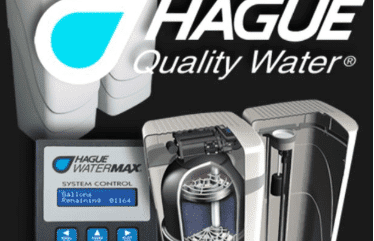What Do Water Softeners Do?
A water softener system is basically an appliance that treats incoming water to the home to remove hardness minerals, including calcium and magnesium, and provide softened water for the home. Removing minerals and “softening” water protects plumbing fixtures and water-using appliances because it prevents hard water scale buildup and iron staining, which in turn helps the home run more efficiently.
Water softeners/conditioners are not the solutions to every water treatment problem, however. There is a myriad of water chemistry problems such as high iron, manganese, hydrogen sulfide and low pH along with many other water problems that require different types of water treatment equipment to correctly treat the water. The first step in determining the proper water treatment solution is a complete water analysis to determine the hardness, iron and other water chemistry issues that may need more treatment than a water softener.
Water softeners have six main components:
Control Valve
Distributor Tube
Water Softener Tank
Water Softening Resin
Brine / Salt Tank
Float Assembly
Water Softener Regeneration Cycles
Water softeners have to regenerate at some point to rinse off the hardness minerals the resin has collected and restored the sodium charge on the resin beads. The regeneration cycles below are the most commonly used, but may vary in the sequence depending on the particular water softener and manufacturer:
Backwash
Brine draw
Slow rinse
Fast rinse
Brine refill
Service
When not regenerating, a water softener is normally in service mode.
Ion Exchange Process
Sodium Chloride (Water softener salt) is used to regenerate the water softener resin beads during the brine draw cycle. Sodium displaces the hardness minerals the resin has collected during the service cycle and the hardness minerals are flushed to the drain.
Every water softener has a given amount of “capacity.” The amount of resin in the softener tank and size of the softener tank determine the total capacity and how many gallons of water can run through the water softener before it has to regenerate. For example, a 9×48 water softener tank will have about 30,000 grains of capacity and a 10×54 tank is about 45,000 grains of capacity. Single tank water softeners, such as the Fleck 7000 above, are factory set to regenerate at 2 o’clock in the morning (This is referred to as delayed regeneration) and takes anywhere from 60 minutes to over 2 hours for a complete regeneration cycle depending on the capacity and size of the water softener. A certain amount of resin is always left out of the total equation to have a little extra capacity on days with heavy water usage. This is referred to as the “Reserve.” Typically, one full day of water use is left as the reserve.
Older water softening systems operated on a “Time Clock” basis and ran a certain number of days per week based on how many pins were set for days to regenerate. Time clock systems have 6 to 14 pins that determine how often it runs. These time clock model water softeners were very inefficient and frequently ran out of softened water when the capacity was exceeded, which was usually on weekends when we all use 2-3 times the water than during the week. When a water softener runs out of capacity the resin is exhausted of softened water causing hard water to service. With a time clock water softener, there needs to be at least one day’s water usage left in reserve to prepare for those heavy usage days. With more modern water softeners reserve capacity is not as important because they are constantly metering the water usage and adjusting the regeneration cycles to accommodate the changing water needs (depending on the manufacturer).
Modern water softening systems regenerate on gallons used and are much more efficient as they only regenerate when needed and tend to have better consistency of softened water. There are basically three types of water softeners: “Cabinet Models”, “Single Tanks,” and “Twin Tanks”. A single tank water softener refers to any water softener with one softener tank and a salt tank. Cabinet model water softeners tend to be the least expensive and are installed by many DIYers, but also tend to only last 3-7 years. You get what you pay for with this style softener and they are very inefficient at removing iron from well water.
An even more efficient option for your water softening system is a “Twin Tank” water softener. This style of water treatment system actually has two water softener tanks. One tank is in service (supplying soft water) while the second tank is in standby. This type of water softener is a true on-demand water treatment system. When one tank becomes almost exhausted of softened water it regenerates immediately and switches to the standby tank that goes into service. Twin Tank softeners normally regenerate during the day when water is being used. Twin Tank systems use a portion of softened water from the second tank to clean the tank that is being regenerated, so they tend to be very efficient at salt usage, supply the best quality water, provide the most consistent quality of softened water, and have fewer service issues because they are regenerating with clean/soft water.
How Do I Choose a Water Softener?
For the best bang for your buck, durability, serviceability, reliability, and longevity, our Bastrop County plumbers would always recommend a separate water softener and brine tank system. A separate water softener and salt storage tank can last well over 20 years. If you decide to install your own water treatment system, it pays to consult with a local plumbing supply house (NOT the box stores). They can be a valuable resource to help you choose the proper system, set it up, and can even provide future technical/service support and possibly even test your water for you. Having a water analysis done by an independent water testing lab is also a good idea. An independent lab can test for bacteria and other concerns that a plumber or even water treatment company would not normally do. A thorough water analysis from a licensed lab can be a useful reference for the future also.
If you seek help from a professional plumbing company, be sure to check them out thoroughly online. Angie’s List, Google Reviews, Yellow Pages, Yelp and various other sites can be a valuable resource to check their work, reviews and customer satisfaction. There is a lot of advice online from so-called water softening sites and experts, but we have found much of the information to be very misleading and quite often just uninformed advice from people that have never been in the plumbing business.
We hope this information and future blog articles can assist you in your search for the proper water treatment system for your home and family. If you do choose the proper water softener system for your needs there is a good possibility of it lasting 20 years or more.
Questions about water softeners?
Contact Parobek Plumbing, LLC today to request a service appointment.



